六年级英语第七课资料讲解
六年级第七课知识点

Lesson7
rainy雨天umbrella雨伞bus stop 汽车站bus driver 司机come--comes(单三)来on a rainy day在雨天school bus校车always总是一直often经常sometimes有时候never从不walk to school走路去学校ride a bike 骑自行车by bus 坐公交车
语法:对某人做某事的频率提问:
What do/does 人称+频率副词+do?
人称+频率副词+动词原形/动词单三
例: What does Jenny often do?詹尼经常干什么?
She often goes to school by bus. 她经常坐公交车去学校。
句子
It’s rainy today. 今天是雨天。
I always have my umbrella on a rainy day. 在雨天我总是带着我的雨伞。
Here comes the school bus.校车来了。
Do you always go to school by bus?你总是坐公交车去学校吗?
No,I often go to school by bus. 不,我经常坐公交车去学校。
Jenny never walks to school. 詹尼从来不走路去学校。
Sometimes she rides her bike.有时候她骑自行车。
冀教版英语六年级上册第七课

冀教版英语六年级上册第七课一、课文标题本课的标题是“The Special Olympics World Games”。
二、课文内容概述本课主要介绍了特殊奥林匹克世界运动会的历史、宗旨和比赛项目。
通过课文,学生们可以了解到特殊奥林匹克运动会是专门为智力障碍人士设立的体育赛事,旨在促进社会对智力障碍人士的接纳和尊重,并提升他们的健康和福祉。
三、重点词汇和短语special Olympics 特殊奥林匹克运动会impairment 障碍integration 融合health and well-being 健康和福祉proudly 自豪地volunteers 志愿者hosts 主办者track and field 田径swimming 游泳basketball 篮球cheerleading 啦啦队四、语法点解析本课的语法点主要包括现在进行时和一般现在时。
现在进行时表示正在进行的动作或正在发生的事情,常与副词如“now”、“right now”等连用。
一般现在时则表示经常发生的动作或存在的状态,常与副词如“always”、“usually”、“often”等连用。
例如,“I am playing basketball now”和“I play basketball every day”。
五、课后练习课后练习包括填空、选择、改错和写作等题型,旨在帮助学生巩固所学词汇和语法知识,提高语言运用能力。
具体练习内容如下:填空:根据上下文填写适当的单词或短语,例如填写动词时态或副词等。
选择:从给定的选项中选择最佳答案,例如选择正确的单词或短语等。
改错:改正句子中的错误,例如语法错误或拼写错误等。
写作:根据所给话题写一篇短文,例如介绍一次难忘的比赛经历等。
六、文化背景介绍特殊奥林匹克运动会是专门为智力障碍人士设立的体育赛事,始于1968年,旨在促进社会对智力障碍人士的接纳和尊重,并提升他们的健康和福祉。
如今,特殊奥林匹克运动会已经成为全球范围内规模最大、参与人数最多的特殊奥林匹克运动会之一,每年有数百万人参加。
六年级上册上海版英语笔记第七课
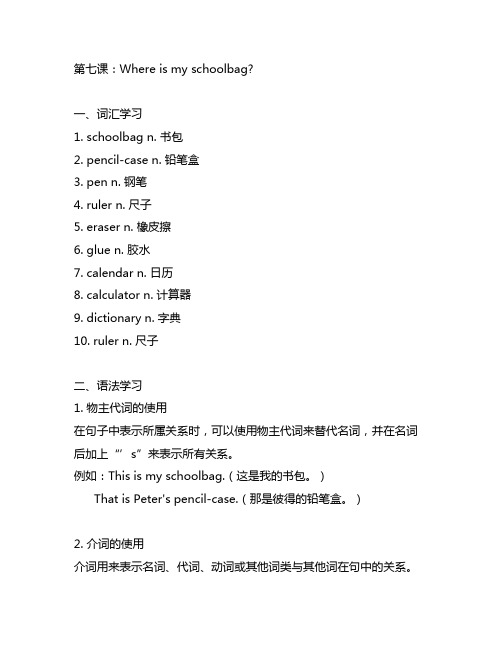
第七课:Where is my schoolbag?一、词汇学习1. schoolbag n. 书包2. pencil-case n. 铅笔盒3. pen n. 钢笔4. ruler n. 尺子5. eraser n. 橡皮擦6. glue n. 胶水7. calendar n. 日历8. calculator n. 计算器9. dictionary n. 字典10. ruler n. 尺子二、语法学习1. 物主代词的使用在句子中表示所属关系时,可以使用物主代词来替代名词,并在名词后加上“’s”来表示所有关系。
例如:This is my schoolbag.(这是我的书包。
)That is Peter's pencil-case.(那是彼得的铅笔盒。
)2. 介词的使用介词用来表示名词、代词、动词或其他词类与其他词在句中的关系。
常见的介词有in, on, at, under, behind等。
例如:The book is on the desk.(书在桌子上。
) The cat is under the table.(猫在桌子下。
)三、对话学习A: Where is my schoolbag?B: It's under the ch本人r.A: Where is my pencil-case?B: It's in your schoolbag.A: Where is my pen?B: It's on your desk.A: Where is my eraser?B: It's behind theputer.A: Where is my ruler?B: It's in your pencil-case.A: Where is my glue?B: It's next to the calendar.A: Where is my calculator?B: It's on the bookshelf.A: Where is my dictionary?B: It's under the bed.A: Where is my ruler?B: It's in your pencil-case.四、练习根据对话内容,用英语写出正确的句子。
六年级英语上册素材-Lesson 7 What’s the date today课文翻译 科普版
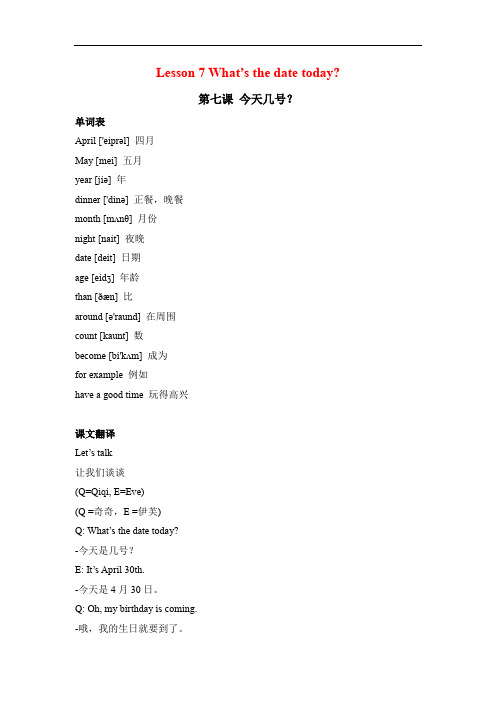
Lesson 7 What’s the date today?第七课今天几号?单词表April ['eiprəl] 四月May [mei] 五月year [jiə] 年dinner ['dinə] 正餐,晚餐month [mʌnθ] 月份night [nait] 夜晚date [deit] 日期age [eidʒ] 年龄than [ðæn] 比around [ə'raund] 在周围count [kaunt] 数become [bi'kʌm] 成为for example 例如have a good time 玩得高兴课文翻译Let’s talk让我们谈谈(Q=Qiqi, E=Eve)(Q =奇奇,E =伊芙)Q: What’s the date today?-今天是几号?E: It’s April 30th.-今天是4月30日。
Q: Oh, my birthday is coming.-哦,我的生日就要到了。
E: When is your birthday?-你的生日是什么时候?Q: It’s on May 5th. When is your birthday?-是在5月5日。
你的生日是什么时候?E: My birthday is in May, too.-我的生日也在五月。
Q: Oh, then we’re the same age.-哦,那我们是同龄人了。
E: No, I’m twelve years old. And you’re ten years old. So I’m older than you.-不,我十二岁了。
你十岁了。
所以我比你大。
Listen and say听和说Mom, I’m back. I’m hungry.-妈妈,我回来了。
我饿了。
There is a cake on the table. You can have it.-桌子上有一块蛋糕。
科普版小学英语六年级上册Lesson7ppt课件
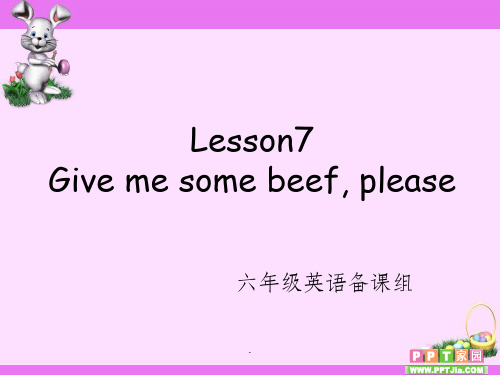
六年级英语备课组
.
教学目标
• 识记食物名词(可数和不可数) • 掌握句型:Give me some beef, please.
Here you are. • 会用日常交际用语:
What are those? They are… Give me some beef, please. Here you are.
请给我一些鱼肉。
B: Here you are.
给你。
ricefishto源自atoes.soup
pork
A: What are those ?
noodles
B: They are pork, soup and noodles.
A: Give me some pork, please.
B: Here you are.
carrots
.
soup
bread
A: What …? B: They are…
bananas A: Give me some…
B: Here you…
.
不可数名词:
noodles cakes
beef 复 数 beef
soup
soup
pork
pork
fish chicken milk
tea r. ice
fish
chicken milk
tea rice
milk
cakes
A: What are those ?
那些是什么?
B: They are milk and cakes. 是牛奶和蛋糕。
[’pƆ:k]
.
.
你能将这些单词宝 宝送回家吗?
六年级下册英语第七课内容

六年级下册英语第七课内容六年级下册英语第七课的内容是"At the Zoo"(在动物园)。
课本主要包括以下内容:1. 生词和短语:课文中包含一些新的生词和短语,比如zoo(动物园),elephant(大象),giraffe(长颈鹿),lion(狮子)等。
学生需要学习并掌握这些新词汇。
2. 对话和问题:课本中会有一段对话和一些相关问题,可以帮助学生提高听力和口语交流能力。
学生需要理解对话的内容,并能回答问题。
3. 描述和比较:课文中会涉及到一些描述和比较的内容,比如描述动物的外貌特征,比较动物的大小和形状等。
学生需要学会用恰当的形容词进行描述和比较。
4. 阅读理解:课本中会有一篇相关的阅读材料,讲述动物园的历史和建筑等。
学生需要通过阅读理解文章的主要内容和细节。
5. 写作练习:课本中会给出一些写作练习,让学生根据给定的题目写一篇关于动物园的短文。
学生需要用正确的语法和词汇来表达自己的想法和观点。
通过完成这些学习任务,学生可以扩展他们的词汇量,提高他们的听说读写能力,了解动物和动物园的知识,并培养他们的观察和描述能力。
继续上述内容,六年级下册英语第七课还包括以下内容:6. 语法:课本中会涉及一些相关的语法知识,如形容词的比较级和最高级,学生需要掌握这些知识并正确运用在描述动物的过程中。
7. 听力训练:课本中会提供一些听力材料,学生需要仔细听并理解听力内容,回答相关问题。
这有助于提高学生的听力技巧和理解能力。
8. 课堂活动和游戏:老师也可以通过一些互动的课堂活动和游戏来巩固学生对课文的理解。
比如,学生可以根据课文中的描述来猜动物是什么,或者通过角色扮演来模拟在动物园的体验。
9. 课后练习:课本会提供一些练习题,供学生课后巩固所学内容。
这些练习可以涉及到课文中的语法、词汇、阅读理解和写作等方面。
通过学习第七课的内容,学生将可以拓宽他们的语言知识和技能,并加深对动物和动物园的了解。
这对提高他们的综合语言能力、听说读写能力以及跨文化交际能力都具有积极的影响。
六年级英语第七课说课

六年级英语第七课第一课时说课稿一、说教学内容和目标:本节课的教学内容是第七课的单词及句子。
学习八个形容词的比较级older younger taller shorter cheaper more expensive better worse 及其用法,要求学生能用…than…来描述比较两样东西,并能进行日常交际。
二、说教学重点和难点:本节课重点是学习八个形容词比较级的变化及用法,并能运用所学句子进行日常交际。
难点是牢记better more expensive worse这三个词的比较级的变化,第二是运用这些形容词的比较级进行日常交际。
所以要想让学生掌握重点,突破难点,老师在教学中要注意突出重点,让学生多练,要由浅入深,运用多媒体等教学手段帮助学生突破难点。
三、说本节课教具:为了能吸引学生的注意力,提高学生学英语的兴趣,提供比较真实的情境,也为了把本节课上得生动些,准备用多媒体进行教学,让学生能运用所学句子看图说英语,但最后还是要用录音让学生跟读。
四、说本节课教学方法:听说法,任务型教学法,讲练法等。
五、说本节课教学思路:(一)课前复习1、课前有日常对话。
2、复习第六课的句子,让学生回答,引出本节课学习的句子。
3、先对学生提问,复习八个形容词。
(二)新授1、课件出示学习八个形容词的比较级,在学习单词时用句子进行巩固。
2、放录音让学生跟读本节课学习内容。
3、学完后即刻进行口头巩固。
(三)巩固1、看图说句子练习。
2、写出本节课所学的形容词比较级。
3、做选择练习。
六、说本节课作业:1、抄写所学单词。
2、牢记所学单词,背诵所学句子。
2011年11月4日。
沪教版六年级上册英语Unit7 Seeing a film 讲义(教师版)
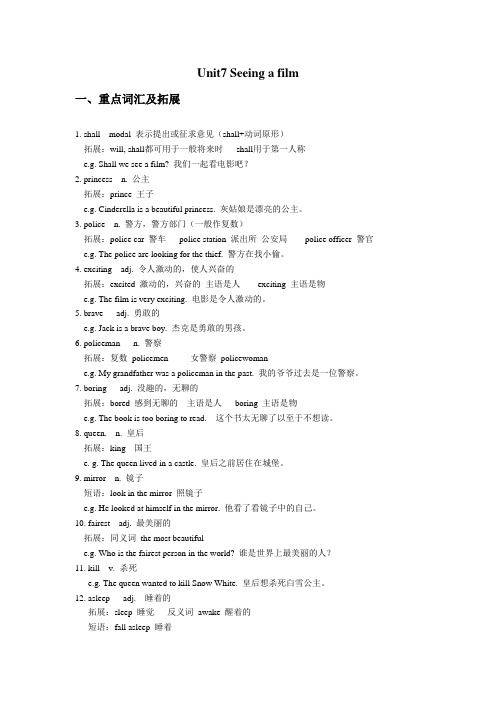
Unit7 Seeing a film一、重点词汇及拓展1. shall modal 表示提出或征求意见(shall+动词原形)拓展:will, shall都可用于一般将来时shall用于第一人称e.g. Shall we see a film? 我们一起看电影吧?2. princess n. 公主拓展:prince 王子e.g. Cinderella is a beautiful princess. 灰姑娘是漂亮的公主。
3. police n. 警方,警方部门(一般作复数)拓展:police car 警车police station 派出所公安局police officer 警官e.g. The police are looking for the thief. 警方在找小偷。
4. exciting adj. 令人激动的,使人兴奋的拓展:excited 激动的,兴奋的主语是人exciting 主语是物e.g. The film is very exciting. 电影是令人激动的。
5. brave adj. 勇敢的e.g. Jack is a brave boy. 杰克是勇敢的男孩。
6. policeman n. 警察拓展:复数policemen 女警察policewomane.g. My grandfather was a policeman in the past. 我的爷爷过去是一位警察。
7. boring adj. 没趣的,无聊的拓展:bored 感到无聊的主语是人boring 主语是物e.g. The book is too boring to read. 这个书太无聊了以至于不想读。
8. queen. n. 皇后拓展:king 国王e. g. The queen lived in a castle. 皇后之前居住在城堡。
9. mirror n. 镜子短语:look in the mirror 照镜子e.g. He looked at himself in the mirror. 他看了看镜子中的自己。
六年级上册英语科普段第七课课文

第七课:Solar System1. Introduction1.1 The solar system is a structureprising the sun and the planets that orbit it, along with their moons, asteroids, and other cosmic debris.1.2 It is the center of our universe and a subject of great interest and study for scientists and astronomers.1.3 In this lesson, we will explore the solar system and learn about its variousponents.2. The Sun2.1 The sun is a massive ball of gas and plasma that generates energy through nuclear fusion.2.2 It is the most important celestial body in the solar system, providing light and heat to the planets.2.3 The sun's gravitational pull keeps the planets in their orbits and affects the behavior of other objects in the solar system.3. The Inner Planets3.1 Mercury, Venus, Earth, and Mars are the four inner planets of the solar system.3.2 They are relatively small and made of rock and metal.3.3 Earth is the only planet known to support life, making it a unique and special place in the solar system.4. The Outer Planets4.1 Jupiter, Saturn, Uranus, and Neptune are the four outer planets of the solar system.4.2 They are much larger than the inner planets and areposed m本人nly of gas and ice.4.3 These planets have many moons and are known for their spectacular rings and storm systems.5. Dwarf Planets and Other Celestial Bodies5.1 Pluto was once considered the ninth planet in the solar system but has since been reclassified as a dwarf planet.5.2 There are many other dwarf planets, asteroids, andets that orbit the sun and contribute to the diversity of the solar system.5.3 These objects provide valuable insights into the formation and evolution of the solar system.6. Conclusion6.1 The solar system is a fascinating andplex system that has captured the imagination of humans for centuries.6.2 By studying the solar system, scientists have g本人ned a deeper understanding of the universe and our place within it.6.3 As we continue to explore and learn more about the solar system, we may uncover even more mysteries and wonders w本人ting to be discovered.以上文章是对六年级上册英语科普段第七课课文的一篇介绍,文章中详细介绍了太阳系的组成、太阳、内行星、外行星、矮行星和其他天体,并对它们的特点进行了说明,最后总结了太阳系的重要性和吸引力。
六年级上册英语书第七课
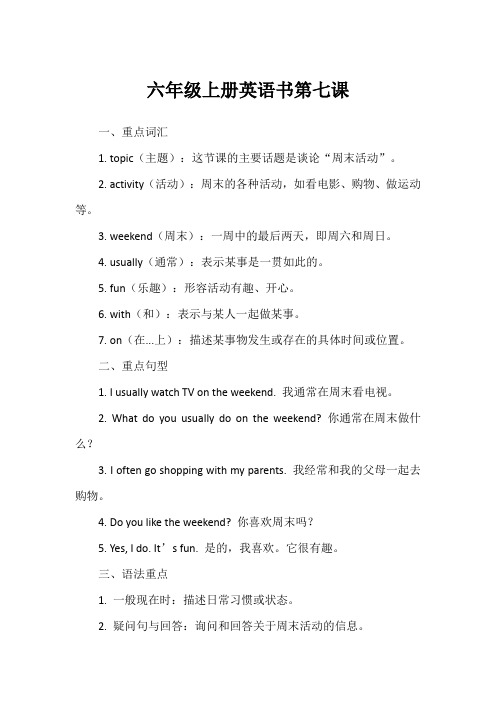
六年级上册英语书第七课一、重点词汇1. topic(主题):这节课的主要话题是谈论“周末活动”。
2. activity(活动):周末的各种活动,如看电影、购物、做运动等。
3. weekend(周末):一周中的最后两天,即周六和周日。
4. usually(通常):表示某事是一贯如此的。
5. fun(乐趣):形容活动有趣、开心。
6. with(和):表示与某人一起做某事。
7. on(在...上):描述某事物发生或存在的具体时间或位置。
二、重点句型1. I usually watch TV on the weekend. 我通常在周末看电视。
2. What do you usually do on the weekend? 你通常在周末做什么?3. I often go shopping with my parents. 我经常和我的父母一起去购物。
4. Do you like the weekend? 你喜欢周末吗?5. Yes, I do. It’s fun. 是的,我喜欢。
它很有趣。
三、语法重点1. 一般现在时:描述日常习惯或状态。
2. 疑问句与回答:询问和回答关于周末活动的信息。
3. 介词使用:如“on the weekend”表示在周末。
四、课后作业1. 写一篇短文,描述你的周末活动计划。
2. 询问你的三个朋友他们的周末活动习惯,并记录下来。
3. 制作一个关于周末活动的海报,包括你喜欢的活动和你不喜欢的活动。
五、家庭作业建议1. 复习本课词汇和句型,尤其是关于周末活动的表达。
2. 尝试与家人或朋友用英语交流关于周末活动的计划或习惯。
六年级下册英语第七课4个场所介绍
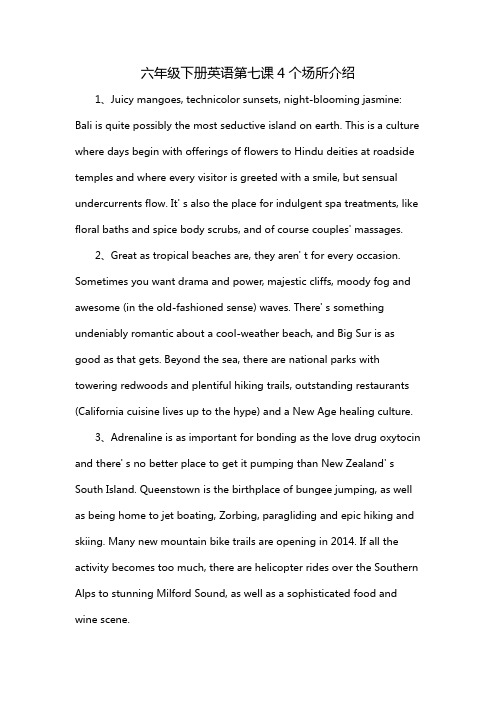
六年级下册英语第七课4个场所介绍1、Juicy mangoes, technicolor sunsets, night-blooming jasmine: Bali is quite possibly the most seductive island on earth. This is a culture where days begin with offerings of flowers to Hindu deities at roadside temples and where every visitor is greeted with a smile, but sensual undercurrents flow. It' s also the place for indulgent spa treatments, like floral baths and spice body scrubs, and of course couples' massages.2、Great as tropical beaches are, they aren' t for every occasion. Sometimes you want drama and power, majestic cliffs, moody fog and awesome (in the old-fashioned sense) waves. There' s something undeniably romantic about a cool-weather beach, and Big Sur is as good as that gets. Beyond the sea, there are national parks with towering redwoods and plentiful hiking trails, outstanding restaurants (California cuisine lives up to the hype) and a New Age healing culture.3、Adrenaline is as important for bonding as the love drug oxytocin and there' s no better place to get it pumping than New Zealand' s South Island. Queenstown is the birthplace of bungee jumping, as well as being home to jet boating, Zorbing, paragliding and epic hiking and skiing. Many new mountain bike trails are opening in 2014. If all the activity becomes too much, there are helicopter rides over the Southern Alps to stunning Milford Sound, as well as a sophisticated food and wine scene.4、Off the beaten track for food and wine tourism, Chile' s main grape-producing region, about two hours south of Santiago, is blissfully unpopulated and impossibly gorgeous, with the Andes' jagged snowcaps rising beyond the rolling vine-covered hills. Along with tasting world-class Carménères, Malbecs, Cabernets and Syrahs, visitors can hike, bike and ride horses (the area is home to Chile' s huaso, or cowboys), explore colonial towns, and visit an excellent museum owned by former arms dealer Carlos Cardoen.。
科普版六年级英语上册 Lesson 7 知识清单

Lesson 7 What’s the date today?一、核心词汇1. 名词:April四月May五月year年dinner正餐,晚餐month月份night夜晚age年龄date日期2. 动词:count数become 成为3. 连词:than比4. 副词:around在周围5. 短语:for example例如have a good time玩得高兴二、了解词汇短语:New Year’s Day元旦Tree Planting Day植树节Teachers’ Day 教师节National Day国庆节Mid-Autumn Festival中秋节Children’s Day儿童节三、核心句型—What’s the date today?今天是几号?—It’s June 2nd.今天是6月2号.解读:问句是一个以what引导的特殊疑问句,用来询问日期.What’s 是what is的缩写.句型结构:What + is + the date + today?回答:It’s+月份+序数词.举一反三:—What’s the date today?今天是几号?—It’s June 25th. 今天是6月25号.—What’s the date today?今天是几号?—It’s May 16th.今天是5月16号.四、了解句型1. So I’m older than you. 所以我比你大.解读:这是一个陈述句,用来对两者进行比较.句型结构:主语+be动词+形容词比较级+than+宾语.举一反三:I am younger than you. 我比你小.She is older than me. 她比我大.2. Where do you come from? 你来自哪里?解读:这是一个由where引导的特殊疑问句,用来询问某人来自哪里.句型结构:Where +助动词+主语+ come from?举一反三:—Where do you come from? 你们来自哪里?—We come from Canada. 我们来自加拿大.3. Mingming always has lunch at twelve o’clock.明明总是在12点吃午饭.解读:这是一个陈述句,表示某人总是做某事.句型结构:主语+always+动词+其他.举一反三:I always go to school early. 我总是很早去学校.She always goes home on time. 她总是按时回家.4. They don’t like to live on the thirteenth floor.他们不喜欢住在第13层.解读:这是一个陈述句,表示某人不喜欢做某事.don’t 表示否定.句型结构:主语+ don’t/doesn’t + like to +动词原形+其他举一反三:He doesn’t like to watch TV.他不喜欢看电视.。
六年级上册英语第七课

六年级上册英语第七课Mid-Autumn Day中秋节Mid-Autumn Day is usually in the month of September or October. 中秋节通常在九月或十月。
On that day, families get together.在那一天,家人们团聚。
We stay outside in the open air and eat a big dinner.我们呆在户外吃大餐。
On that day, we eat mooncakes.在那一天,我们吃月饼。
The mooncakes are small and round.月饼又小又圆。
They look like the moon.它们看起来像月亮。
There are many kinds of mooncakes.月饼有很多种。
They can have meat, nuts or something sweet inside.它们里面可以有肉、坚果或一些甜的东西。
On that day, the moon becomes brighter and rounder.在那一天,月亮变得更亮更圆。
We call it the full moon.我们称之为满月。
Everyone takes time to look at the moon at night.每个人晚上都会花时间去看月亮。
This is our Mid-Autumn Day.这是我们的中秋节。
It is a Chinese festival.它是一个中国的节日。
It is time for us to enjoy the happiness with our family. 是我们和家人一起享受幸福的时刻。
英语冀教版六年级上册第七课

英语冀教版六年级上册第七课
本课是冀教版六年级上册的第七课,主要讲述了学生们在暑假期间的活动安排。
通过本课的学习,我们可以总结出以下几点:
1. 暑假是学生们放松和休息的时间。
在课文中,学生们计划了各种各样的活动,如去海边游泳、去山上爬山、去动物园看动物等。
这些活动可以让学生们放松身心,享受假期的乐趣。
2. 暑假也是学生们学习的好时机。
在课文中,学生们提到了他们要利用暑假时间多读书、多写作业,提高自己的学习成绩。
这说明学生们认识到暑假不仅是玩乐的时间,也是提高自己的好机会。
3. 学生们应该合理安排暑假活动。
在课文中,学生们提到了他们要制定一个暑假计划,安排好每天的活动。
这样可以帮助他们更好地利用时间,既能玩乐,又能学习。
4. 家长们也应该关注孩子们的暑假活动。
在课文中,学生们提到了他们的父母会陪伴他们一起参加一些活动,如去海边游泳、去山上爬山等。
这说明家长们应该关注孩子们的暑假活动,给予他们关心和支持。
译林版英语六年级上册第七课课文
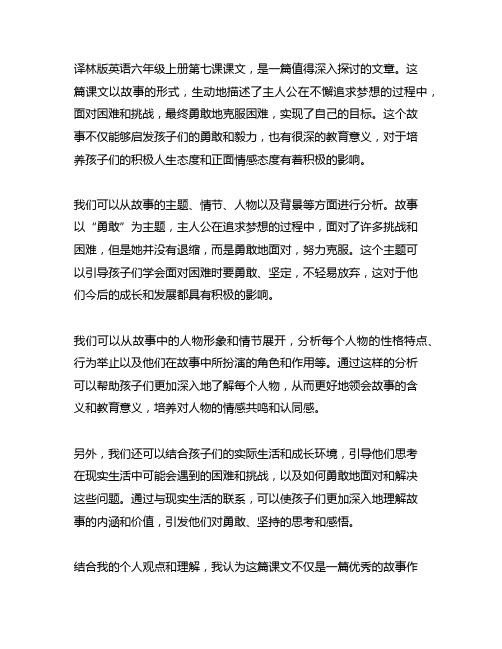
译林版英语六年级上册第七课课文,是一篇值得深入探讨的文章。
这篇课文以故事的形式,生动地描述了主人公在不懈追求梦想的过程中,面对困难和挑战,最终勇敢地克服困难,实现了自己的目标。
这个故事不仅能够启发孩子们的勇敢和毅力,也有很深的教育意义,对于培养孩子们的积极人生态度和正面情感态度有着积极的影响。
我们可以从故事的主题、情节、人物以及背景等方面进行分析。
故事以“勇敢”为主题,主人公在追求梦想的过程中,面对了许多挑战和困难,但是她并没有退缩,而是勇敢地面对,努力克服。
这个主题可以引导孩子们学会面对困难时要勇敢、坚定,不轻易放弃,这对于他们今后的成长和发展都具有积极的影响。
我们可以从故事中的人物形象和情节展开,分析每个人物的性格特点、行为举止以及他们在故事中所扮演的角色和作用等。
通过这样的分析可以帮助孩子们更加深入地了解每个人物,从而更好地领会故事的含义和教育意义,培养对人物的情感共鸣和认同感。
另外,我们还可以结合孩子们的实际生活和成长环境,引导他们思考在现实生活中可能会遇到的困难和挑战,以及如何勇敢地面对和解决这些问题。
通过与现实生活的联系,可以使孩子们更加深入地理解故事的内涵和价值,引发他们对勇敢、坚持的思考和感悟。
结合我的个人观点和理解,我认为这篇课文不仅是一篇优秀的故事作品,更是一篇具有教育意义的文章。
它能够启发孩子们的思维和情感,培养他们的积极生活态度和人生观念,对于他们的成长和成才具有积极的意义和价值。
译林版英语六年级上册第七课课文,是一篇富有教育意义的文章,通过深入分析和研究这篇课文,可以帮助孩子们更好地理解故事内涵,领会故事的积极向上的价值观念,培养他们的勇敢、坚定和乐观的生活态度。
故事的主人公是一个叫小琳的女孩,她有一个很大的梦想,那就是成为一名优秀的音乐家。
从小,小琳就展现出了对音乐的热爱和天赋,她非常喜欢弹钢琴,每天都会用心练习,她坚信只要努力,就一定能够成为一名出色的音乐家。
然而,小琳的梦想并不是一帆风顺的。
6年级上册英语第7课

6年级上册英语第7课[标题:6年级上册英语第7课]在6年级上册英语第7课中,我们学习了与日常生活和日常活动相关的一些词汇和句型。
本文将通过几个主要主题进行探讨,包括常见动词,时间表达,日常活动等。
一、常见动词本课程中,我们学习了一些日常生活中常见的动词。
其中包括:walk(走),run(跑),eat(吃),drink(喝),play(玩),dance (跳舞)等等。
这些动词在我们的日常交流中非常常用,掌握它们能够更好地表达我们的意思。
例如:I usually walk to school in the morning.(我通常早上步行去学校。
)二、时间表达在进行日常活动的描述时,掌握一些时间表达是非常重要的。
在本课中,我们学习了表达每天活动的时间短语,例如:in the morning (早上),in the afternoon(下午),in the evening(晚上)等等。
这些短语能够帮助我们更好地描述我们的日常活动时间。
例如:I have English class in the afternoon.(我在下午有英语课。
)三、日常活动本课程中,我们还学习了一些描述日常活动的表达方式。
例如:have breakfast(吃早餐),go to school(去学校),do homework(做作业),watch TV(看电视)等等。
这些短语可以帮助我们描述我们的日常活动,使我们的交流更加流利。
例如:I usually have breakfast at 7 o'clock in the morning.(我通常在早上七点吃早餐。
)四、日常活动的时间顺序在描述日常活动时,我们需要注意时间的顺序。
通常我们使用时间副词来表达不同活动之间的时间关系。
例如:first(首先),then(然后),next(接下来),finally(最后)等等。
这些词语可以帮助我们组织我们的句子,使其更加通顺。
例如:First, I walk to school. Then, I have English class. Next, I eat lunch. Finally, I play with my friends.(首先,我步行去学校。
六年级上册英语第七课笔记

六年级上册英语第七课笔记一、单词1. usually(通常)2. during(在……期间)3. vacation(假期)4. summer(夏天)5. winter(冬天)6. season(季节)7. spring(春天)8. fall(秋天)9. breakfast(早餐)10. lunch(午餐)11. dinner(晚餐)12. bedtime(就寝时间)二、短语1. plan to do sth. 计划做某事2. go to the beach 去海滩3. go swimming 去游泳4. visit grandparents 拜访祖父母5. read books 阅读书籍6. go for a walk 去散步7. do homework 做家庭作业8. watch TV 看电视9. listen to music 听音乐10. play games 玩游戏11. eat dinner 吃晚餐12. go to bed 去睡觉三、句子1. I usually plan what I am going to do on the weekend. 我通常计划周末要做什么。
2. During the summer vacation,I go to the beach and go swimming. 在暑假期间,我去海滩和游泳。
3. On weekends,I usually visit my grandparents and read books with them. 在周末,我通常拜访我的祖父母和他们一起阅读书籍。
4. After dinner,I usually watch TV and listen to music. 晚饭后,我通常看电视和听音乐。
5. Before going to bed,I usually do my homework and play games with my family. 上床睡觉前,我通常做家庭作业和与家人玩游戏。
六年级英语第7讲讲义

primary /ˈpraɪm ər ɪ/ adj. 初级的,初等的;小学的I love my primary school.middle /ˈm ɪdl/ adj. 中部的;中等的;中间的But I’m going to a middle school soon.speech /spiːtʃ/ n. 演说;讲演 So I want to make a speech to my classmates.future/ˈfjuːtʃə(r)/ n. 未来,将来 “We may go to different schools in the future.”happiness/ˈhæp ɪn əs/ n. 幸福,快乐 “But you will always be a reason for my happiness.”课堂练习1. Jack is 10 years old. He is a(n) _____ school student.A. surprisedB. primaryC. interested 2. Leo is fifteen years old. He is a _____ school student.A. cloudyB. middleC. primary3. Tom is good at giving _____.A. speechesB. mistakesC. space4. People will live longer in the _____.A. laterB. travelC. future5. The man found his _____ by staying with his family.A. happinessB. happyC. happyness6. My brother is a _____ school student.A. middleB. wishC. excited【搭配】primary school 小学【搭配】middle school 初中【搭配】give/make a speech 发表演讲【搭配】in the future 在将来【拓展】happy adj. 快乐的,高兴的7.After _____ school, students will enter the middle school.A. primaryB. middleC. small8.He is too shy to give a _____ in public.A. speechB. wishC. happiness9.I want to be a doctor in the _____.A. primaryB. middleC. future10.Parents always want their children to have _____.A. speechB. happinessC. primary。
冀教版六年级下册第七课知识点汇总
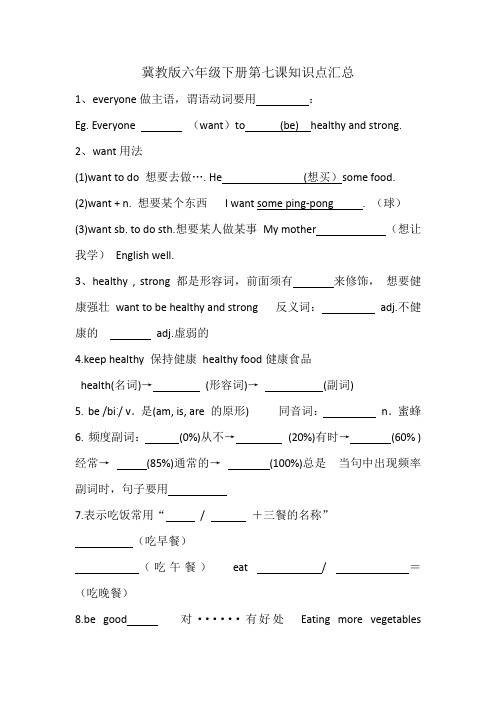
冀教版六年级下册第七课知识点汇总1、everyone做主语,谓语动词要用:Eg. Everyone (want)to (be) healthy and strong. 2、want用法(1)want to do 想要去做…. He (想买)some food.(2)want + n. 想要某个东西I want some ping-pong . (球)(3)want sb. to do sth.想要某人做某事My mother (想让我学)English well.3、healthy , strong 都是形容词,前面须有来修饰,想要健康强壮want to be healthy and strong 反义词:adj.不健康的adj.虚弱的4.keep healthy 保持健康healthy food健康食品health(名词)→(形容词)→(副词)5.be /biː/ v.是(am, is, are 的原形) 同音词:n.蜜蜂6.频度副词:(0%)从不→(20%)有时→(60% )经常→(85%)通常的→(100%)总是当句中出现频率副词时,句子要用7.表示吃饭常用“/ +三餐的名称”(吃早餐)(吃午餐)eat / =(吃晚餐)8.be good 对······有好处Eating more vegetablesyour health.be bad for 对······有坏处Fast food our body.be good at 擅长于做某事,后多+ V.ing Li Ming (擅长打)basketball.9.“多久一次”,用来提问某一动作或状态发生的频率。
回答常用:(一次);(一天两次);(一周三次); (总是); (有时); (经常); (从不)等表示频率或次数的单词或短语。
- 1、下载文档前请自行甄别文档内容的完整性,平台不提供额外的编辑、内容补充、找答案等附加服务。
- 2、"仅部分预览"的文档,不可在线预览部分如存在完整性等问题,可反馈申请退款(可完整预览的文档不适用该条件!)。
- 3、如文档侵犯您的权益,请联系客服反馈,我们会尽快为您处理(人工客服工作时间:9:00-18:30)。
Just read and talk
• Bob:Hi,Peter. I have a new toy car.
• Peter:Can I Have a look,please? • Bob:Sure!Open the box and see.
语法点
• 祈使句:课文Open the box and see. • 祈使句是用来表达命令、请求、劝告、警
告、禁止等的句子。 • 祈使句常常省略主语(you) • 祈使句里的谓语动词一般用原形。 • Do型和Be型祈使句主要用于要求第二人称
做某事,当命令第一人称或第三人称时, 要用Let型祈使句。
祈使句例句
• Do型的:动词原形+其他 • Come in ,please!请进! • Be型的:Be+表语(名词或形容词)+其他 • Be quiet,please 请安静。 • Let型:Let+宾语+动词原形+其他 • Let Bob go shopping!让鲍勃去购物吧
•
What an interesting film(it is)!
• 第二种:What +形容词+可数名词复数/不可数名
课文
• Bob:Yes.I like collecting them. What`s your hobby,Peter?
• Peter:My hobby is collecting stamps.
此课件下载可自行编辑修改,仅供参考! 感谢您的支持,我们努力做得更好!谢谢
翻译
看一看 打开盒子 我喜欢弹钢琴 我的爱好是踢足球。 你的爱好是什么? 我的爱好是读书。 have a look Open the box I like playing the piano My hobby is playing football. What's your
hobby? My hobby is reading.
Peter:Wow!What a super car!Do
you like toy cars?
• What引导的感叹句,
• 课文What a super car!
• what在感叹句中修饰名词,
• 有what引导的感叹句有两种形式:
• What a/an +形容词+可数名词单数(+主语+谓 语
• 例如:What a clever boy(he is)
cards.Look! • Bob&Peter:Oh!They`re so colourful
and beautiful !
练习问答
What is your hobby,Peter?
What is your hobby? My hobby is collecting maps.
达标训练
• 1、We have a new English teacher .否定句 • We ___ ___a new English teacher. • 2、Open the box.否定句 • ___ ___the box. • 3、My hobby is playing games.划线部分提问 • ___ ___ hobby? • 4、His hobby is playing games.同义句 • ___ ___playing games. • 5、His hobby is cooking dinner. • His hobby___ ___cooking dinner.
语法点
• 询问对方的爱好是什么的句型: • 疑问词+be动词+人/物+其他? • What`s your hobby? • 答语句型:My hobby is +动词+ing形
式(+其他) • My hobby is collecting stamps.
课文
• Bob:How about you,Kate and Li Yan? • Kate:My hobby is collecting maps. • Li Yan:I like collecting picture
